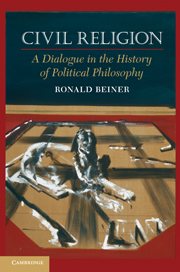Book contents
- Frontmatter
- Contents
- Preface and Acknowledgments
- Introduction
- Part I Machiavelli, Hobbes, Rousseau
- Part II Responses to (and Partial Incorporations of) Civil Religion within the Liberal Tradition
- 9 Baruch Spinoza
- 10 Philosophy and Piety
- 11 Spinoza's Interpretation of the Commonwealth of the Hebrews, and Why Civil Religion Is a Continuing Presence in His Version of Liberalism
- 12 John Locke
- 13 “The Gods of the Philosophers” I
- 14 Bayle's Republic of Atheists
- 15 Montesquieu's Pluralized Civil Religion
- 16 The Straussian Rejection of the Enlightenment as Applied to Bayle and Montesquieu
- 17 “The Gods of the Philosophers” II
- 18 Hume as a Successor to Bayle
- 19 Adam Smith's Sequel to Hume (and Hobbes)
- 20 Christianity as a Civil Religion
- 21 John Stuart Mill's Project to Turn Atheism into a Religion
- 22 Mill's Critics
- 23 John Rawls's Genealogy of Liberalism
- 24 Prosaic Liberalism
- Part III Theocratic Responses to Liberalism
- Part IV Postmodern “Theism”
- Conclusion
- Index
- References
24 - Prosaic Liberalism
Montesquieu versus Machiavelli, Rousseau, and Nietzsche
Published online by Cambridge University Press: 05 June 2012
- Frontmatter
- Contents
- Preface and Acknowledgments
- Introduction
- Part I Machiavelli, Hobbes, Rousseau
- Part II Responses to (and Partial Incorporations of) Civil Religion within the Liberal Tradition
- 9 Baruch Spinoza
- 10 Philosophy and Piety
- 11 Spinoza's Interpretation of the Commonwealth of the Hebrews, and Why Civil Religion Is a Continuing Presence in His Version of Liberalism
- 12 John Locke
- 13 “The Gods of the Philosophers” I
- 14 Bayle's Republic of Atheists
- 15 Montesquieu's Pluralized Civil Religion
- 16 The Straussian Rejection of the Enlightenment as Applied to Bayle and Montesquieu
- 17 “The Gods of the Philosophers” II
- 18 Hume as a Successor to Bayle
- 19 Adam Smith's Sequel to Hume (and Hobbes)
- 20 Christianity as a Civil Religion
- 21 John Stuart Mill's Project to Turn Atheism into a Religion
- 22 Mill's Critics
- 23 John Rawls's Genealogy of Liberalism
- 24 Prosaic Liberalism
- Part III Theocratic Responses to Liberalism
- Part IV Postmodern “Theism”
- Conclusion
- Index
- References
Summary
Nietzsche himself had a Christian view of history, seeing the present moment always as some crisis, some fall from classical greatness, some corruption or evil to be saved from. I call that Christian.
– Saul BellowI do in fact think that the organization of social life on this earth turns out, in the end, to be rather prosaic.
– Raymond AronWhat is there in common between thinkers as different as Machiavelli, Rousseau, and Nietzsche? Framing the contours of a liberal subtradition within the tradition of modern political philosophy helps to answer this question. Relative to the tradition of liberal political philosophy, we can say that all three are agreed that a bourgeois-commercial vision of life appears as cowardly and effeminate – as lacking in grandeur, or in the moral heroism that renders human beings fully human. In Chapter 1, I discussed Montesquieu's comparison of republican virtue and monkish “austerity” in Spirit of the Laws, Book 5, chapter 2. Montesquieu's formulation is that in the case of the virtue of the ancient republican citizen, as in the case of the austerities of the self-abnegating monk, “their regimen deprives them of everything upon which ordinary passions [les passions ordinaires] rest.” The notion of “ordinariness” suggested in this text merits further reflection, for in fact it goes to the heart of the liberal conception of social life. In this respect, Montesquieu presents himself as an exemplar of the liberal tradition, in juxtaposition to whom we can consider Machiavelli, Rousseau, and Nietzsche as virtual “allies.”
There is no question that the work of Montesquieu enacts an ongoing critical dialogue with the theoretical challenge of Machiavelli – just as there is in Rousseau a continuous critical dialogue with Montesquieu. (Interestingly, one finds no discussion of Montesquieu in the work of Nietzsche; there is only a single passing reference to Montesquieu in the entire published work of Nietzsche.) For one very striking vindication of this subterranean philosophical dialogue, consider the terms in which Montesquieu offers his decisive articulation of the idea of moeurs douces: “[O]ne should not be surprised if our mores are less fierce [féroces] than they were formerly” (Spirit of the Laws, Book 20, chapter 1). The reference to ferocity in this text cannot help but make one think that Montesquieu's intention is to respond to Machiavelli's critique of Christianity in Discourses on Livy, II.2 (with its invocation of the impressive bloodletting of Roman spectacles). Machiavelli and Montesquieu share a fascination with the larger-than-life grandeur of ancient politics, but Montesquieu's ultimate commitment is to the judgment of ancient politics according to the standards of modern, liberal, post-Christian notions of “soft mores,” moderation, respect for each other's humanity, and devotion to law, and there is no corresponding commitment to any of this in Machiavelli.
- Type
- Chapter
- Information
- Civil ReligionA Dialogue in the History of Political Philosophy, pp. 301 - 306Publisher: Cambridge University PressPrint publication year: 2010



